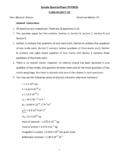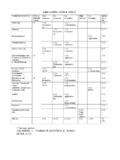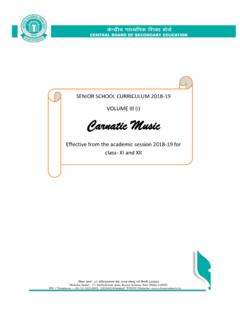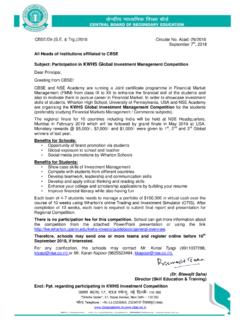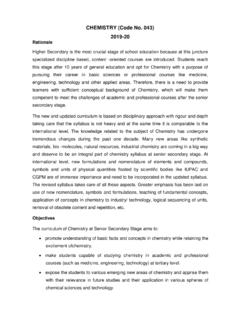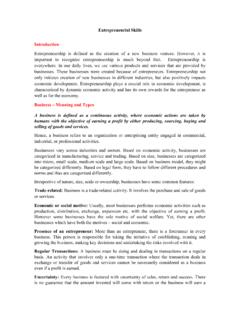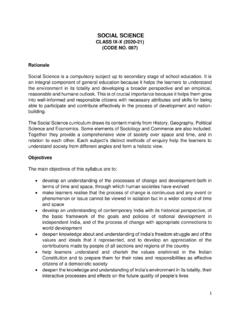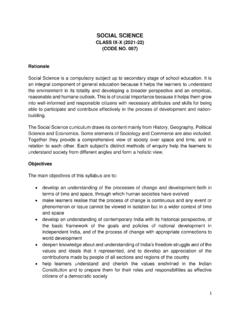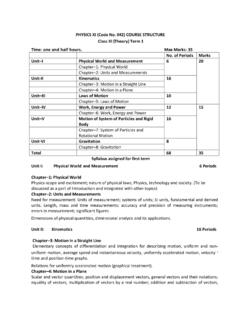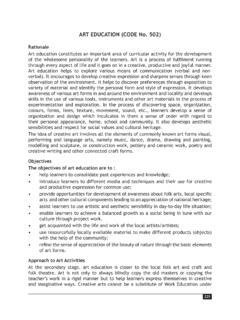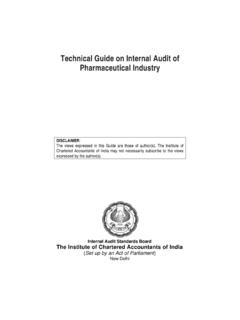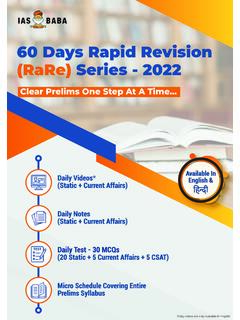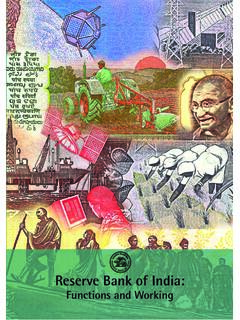Transcription of POLITICAL SCIENCE (Code No. 028) (2021-22)
1 POLITICAL SCIENCE (Code No. 028). (2021-22). Rationale At the senior secondary level, students who opt for POLITICAL SCIENCE are given an opportunity to get exposed to the diverse concepts of the discipline helping them to be a global citizen and develop skills to understand, apply and evaluate. At this level, there is a need to enable students to have the skills to engage with POLITICAL processes that surround them and provide them with an understanding of the historical context that has shaped the present. The different courses expose the students to various streams of the discipline of POLITICAL SCIENCE : POLITICAL Theory, Indian Politics and International Politics. Concerns of the other two streams - Comparative Politics and Public Administration- are accommodated at different places in these courses. In introducing these streams, special care has been taken not to burden the students with the current jargon of the discipline.
2 The basic idea here is to lay the foundations for a serious engagement with the discipline and develop competencies related to POLITICAL SCIENCE to prepare them for higher education, learning and knowledge. Broad Competencies and Outcomes (Teachers can also plan and develop themselves during the transaction of the topics): 1. Indian Constitution at Work: Competency: Understanding, identifying and analyzing the key features, historical processes and working of the Constitution of India. Outcomes: The students will: Understand the historical processes and the circumstances in which the Constitution was drafted. Be familiar with the diverse perspectives that guided the makers of the Indian Constitution. Identify key features of the Constitution and compare these to other constitutions in the world. Analyse the working of the Constitution in real life. 2. POLITICAL Theory: Competency: Understanding, critically evaluating and applying POLITICAL theory Outcomes: After the course the students will: Understand different themes and thinkers associated with the real life.
3 Develop the skills for logical reasoning Meaningfully participate in the issues and concerns of POLITICAL life surrounding them. 3. Contemporary World Politics: Competency: Understanding, analyzing the Contemporary World Politics Outcomes: After the course the students will: Understand the contemporary world. Understand the key POLITICAL events and processes in the post -cold war era. Analyze various global institutions, processes and events shaping their lives. 4. Politics in India after independence : Competency: Critically evaluate and understand, analyze politics in India after independence Outcomes: After the course the students will: Understand and analyze constitutional institutions, figures and their working in the post - independence period; POLITICAL events, trends, other facts and figures and contribution of eminent personalities from the post - independence to contemporary India.
4 Develop their capacity to link POLITICAL policies and processes with contemporary realities. Encourage the students to understand and analyse the challenges for contemporary India. COURSE CONTENTS. Part A: Indian Constitution at Work 1. Constitution 30 Periods Constitution: The Philosophy and Making of the Constitution, Fundamental Rights and Duties, Directive Principles of State Policy, Constitutional Amendments. 2. Election and Representation 14 Periods Elections and Democracy, Election System in India, Electoral Reforms. 3. Legislature 14 Periods Why do we need a Parliament? Unicameral/Bicameral Legislature, Functions and Power of the Parliament, Parliamentary Committees, Parliamentary Officials: Speaker, Deputy Speaker, Parliamentary Secretary. 4. Executive 12 Periods Parliamentary Executive in India: the President, the Prime Minister and the Council of Ministers.
5 Permanent Executive: Bureaucracy. 5. Judiciary 12 Periods Why do we need an Independent Judiciary? Structure and Jurisdiction of the Judiciary, Judicial Review, Judicial Activism, Judicial Over-reach. 6. Federalism 14 Periods Meaning of Federalism, Evolution & Growth of Indian Federalism: Quasi Federalism, Cooperative Federalism, Competitive Federalism. 7. Local Governments 14 Periods Why do we need Local Governments? Growth of Local Governments in India, 73rd and 74th Constitutional Amendments, Working and Challenges of Local Governments. Part B: POLITICAL Theory 8. POLITICAL Theory: An Introduction 12 Periods What is Politics? Politics vs POLITICAL Theory, Importance of POLITICAL Theory. 9. Liberty 12 Periods Liberty vs Freedom, Negative and Positive Liberty. 10. Equality 12 Periods What is Equality? Significance of Equality, Various Dimensions of Equality, How can we promote Equality?
6 11. Justice 12 Periods What is Justice? Different Dimensions of Justice, Distributive Justice. 12. Rights 12 Periods What are Rights? History of Rights, Kinds of Rights, Human Rights. 13. Citizenship 13 Periods Citizen and Citizenship, Citizen and Nation, Global Citizenship. 14. Nationalism 13 Periods Nation and Nationalism, Variants of Nationalism, Nationalism & Multiculturalism. 15. Secularism 12 Periods What is Secularism? Western and Indian Perspectives of Secularism, Salient Features of Indian Secularism. 16. Development 12 Periods Growth vs. Development, Different Models of Development Welfare State Model, Market Model, Developmental Model. Prescribed Books: 1. Indian Constitution at Work, Class XI, Published by NCERT. 2. POLITICAL Theory, Class XI, Published by NCERT. 3. Uploaded Additional Study Materials Note: The above textbooks are also available in Hindi and Urdu versions.
7 The weightage of marks over the different paper shall be as follows:- 1. Weightage of Content Part A: Indian Constitution at Work Unit Content Marks s s 1 Constitution 12. 2 Election and Representation 10. 3 The Legislature 4 The Executive 08. 5 The Judiciary 6 Federalism 10. 7 Local Governments Total 40. Part B: POLITICAL Theory Unit Contents Marks s 8 POLITICAL Theory: An Introduction 06. 9 Liberty 08. 10 Equality 11 Justice 08. 12 Rights 13 Citizenship 10. 14 Nationalism 15 Secularism 08. 16 Development Total 40. Question Paper Design (2021-22). POLITICAL SCIENCE (Code NO. 028). CLASS XI. TIME: 3 Hours Max. Marks : 80. Competencies Total Marks % Weightage 1 Demonstrative Knowledge + Understanding (Knowledge based simple recall questions, to know specific facts, terms, concepts, principles, or theories, Identify, define, or recite, information) (Comprehension 29 Upto 37%.)
8 To be familiar with meaning and to understand conceptually, interpret, compare, contrast, explain, paraphrase information). 2 Knowledge / Conceptual Application (Use abstract information in concrete situation, to apply knowledge to new situations; Use given 27 Upto 33%. content to interpret a situation, provide an example, or solve a problem). 3 Formulation Analysis, Evaluation and Creativity (Analysis & Synthesis- Classify, compare, contrast, or differentiate between different pieces of information; 24 Upto 30%. Organize and/or integrate unique pieces of information from a variety of sources)(includes Map interpretation). Total 80 100%. Project work 20 marks. Scheme of Options: There is an internal choice for long answer questions of 6 marks. In order to assess different mental abilities of learners, question paper is likely to include questions based on passages, visuals such as maps, cartoons, etc.
9 No factual question will be asked on the information given in the plus (+) boxes in the textbooks. POLITICAL SCIENCE (Code No. 028). Class XII (2021-22). Time: 3 hrs. Max. Marks: 80. Part A: Contemporary World Politics Units Contents Periods Marks 1 Cold War Era and Non aligned Movement 18. 12. 2 The End of Bipolarity 18. 3 New Centers of Power 16. 12. 4 South Asia and the Contemporary World 16. 5 United Nations and its Organizations 12. 08. 6 Security in Contemporary World 10. 7 Environment and Natural Resources 10. 08. 8 Globalization 10. Total 110 40. Part B: Politics in India Since independence Units Contents Periods Marks 9 Challenges of Nation-Building 36 12. 10 Planning and Development 11 India's Foreign Policy 08 06. 12 Parties and the Party Systems in India 30 10. 13 Democratic Resurgence 14 Social and New Social Movements in India 36. 15 Regional Aspirations 12.
10 16 Indian Politics: Trends and Developments Total 110 40. COURSE CONTENTS. Part A: Contemporary World Politics Cold War and Non-aligned Movement 1 Emergence of two power blocs/Bipolarity, Non-aligned Movement 18. (NAM). Periods The End of Bipolarity 18. 2 Disintegration of Soviet Union, Unipolar World, Middle East Crisis Periods Afghanistan, Gulf War, Democratic Politics and Democratization . CIS and the 21st Century (Arab Spring). New Centres of Power 3 Organizations: European Union, ASEAN, SAARC, BRICS. Nations: 16. Periods Russia, China, Israel, India. South Asia and the Contemporary World 16. 4 Conflicts and efforts for Peace and Democratization in South Asia: Periods Pakistan, Nepal, Bangladesh, Sri Lanka, Maldives. United Nations and its Organizations 12. 5 Principle Organs, Key Agencies: UNESCO, UNICEF, WHO, ILO, Periods Security Council and the Need for its Expansion.
